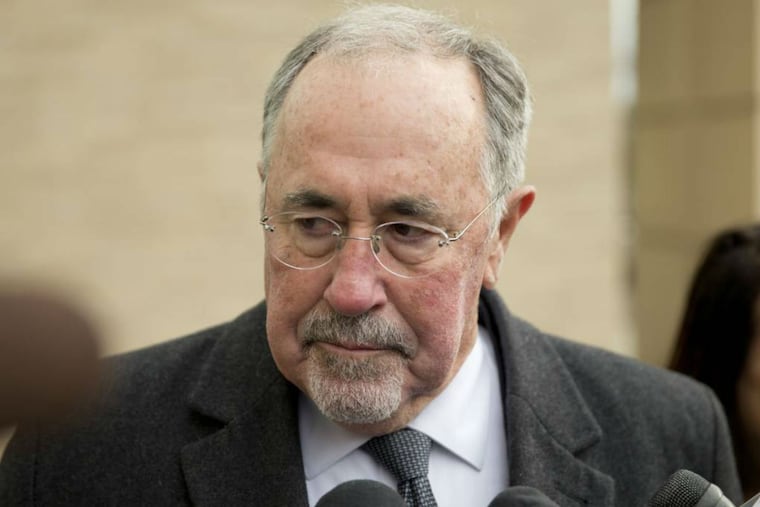Inquirer Editorial: Don't let Eakin avoid a trial
The aversion to judgment among Pennsylvania's highest-ranking judges is not to be underestimated. Consider newly defrocked state Supreme Court Justice J. Michael Eakin, who made strenuous attempts over the course of more than a year to avoid or manipulate his trial on ethics charges stemming from profane and bigoted emails.

The aversion to judgment among Pennsylvania's highest-ranking judges is not to be underestimated. Consider newly defrocked state Supreme Court Justice J. Michael Eakin, who made strenuous attempts over the course of more than a year to avoid or manipulate his trial on ethics charges stemming from profane and bigoted emails.
Once those efforts failed and his day in court loomed, Eakin seized what was perhaps the last remaining opportunity to avoid it by removing himself from the bench Tuesday, effectively accepting the greatest possible disciplinary penalty short of the loss of his pension. As much as the offensive messages, the justice's relentless quest to escape adjudication warranted his resignation, which the Inquirer called for in December. For the same reason, the Court of Judicial Discipline should proceed with a trial.
Eakin's dodging and dissembling date to the inception of his case in 2014. After Justice Seamus P. McCaffery threatened to expose him before resigning amid an investigation of similar emails, Eakin offered an incomplete "self-report" of his questionable communications to judicial disciplinary officials. The justice then enjoyed a kid-gloves investigation and premature exoneration by a Judicial Conduct Board whose members included a recipient of some of the same emails and whose chief counsel was Eakin's friend and onetime campaign representative. After further disclosures forced the reinvestigation that eventually yielded ethics charges against him, the justice proposed bypassing the conduct board for the Court of Judicial Discipline, which he tried to pack with a presumably sympathetic appointee.
Even as a trial neared, there were signs that the case would, like McCaffery's, end in a backroom bargain. When disciplinary court Judge Jack Panella ruled out that possibility last month and said the case should proceed to trial - an instinct that remains correct despite the justice's resignation - Eakin's lawyer greeted the notion as a "total shock."
Eakin's conduct was shocking enough for a member of the state's highest court. Emails he sent included an ostensible joke about a battered woman and a vow to close what he called his "titty deficit" by patronizing out-of-state strip clubs, none of which suggests the egalitarian approach expected of the state's highest court. His exchange of such potentially compromising messages with attorneys raised additional questions.
The case has been similarly revealing of the justice's and the judiciary's severe allergy to accountability. His resignation should not preclude the public airing of the charges that he has tried to avoid. But it should further empower the court's recently elected justices to strengthen the disciplinary system to ensure that future cases are handled more competently and impartially.
A few weeks before Eakin's resignation, five former governors from both parties joined Gov. Wolf in supporting legislation to replace the state's low-interest, high-cost, partisan judicial elections with a merit-based selection process for the state's appellate judges. Eakin's departure in disgrace, the third from the high court in as many years, makes it that much clearer that the alternative is regular and reliable scandal.